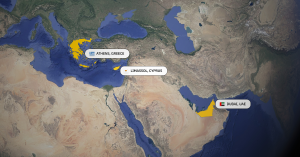Central and Eastern Europe (CEE) has been experiencing a significant transformation in the tech landscape, with an inflow of multinational companies and innovative startups establishing their presence in the region. And notably — the CEE tech talent emerges as one of the driving forces behind this growth.
With over 2.3 million ICT specialists in the CEE region, the sector represents nearly 3% of the workforce. Poland — the region’s most populous and developed ecosystem — represents almost a quarter of that workforce, employing over 500,000 people in the ICT industry.
Over the past two decades, CEE has started to gain global attention, attracting many multinational corporations, including Amazon, IBM, Oracle, SAP, Microsoft, Cisco, Google, and Intel, with more seeking to open offices there, including Open AI’s interest to open European headquarters in Poland.
“I don’t know what Poland does as a culture and a system to create such incredible engineering and research talent and also such rigor, which has been, I think, very important to OpenAI’s success, but it’s quite remarkable the impact that it’s had,” stated the CEO of OpenAI, Sam Altman, during a visit in Poland earlier this year.
In this article, The Recursive explores why the CEE region is becoming an attractive destination for companies to base their development teams, capitalizing on the region’s combination of innovation hub, emerging tech ecosystem, and dynamic startup scene.
4 Reasons CEE tech talent attracts businesses — from startups to global giants
1. Thriving tech ecosystem and strategic location
At the heart of the CEE region lies a thriving tech ecosystem. As the region evolves into an innovation hub that fosters knowledge sharing, industry collaboration, and global partnerships, it provides an ideal base for both international and local companies.
According to the Central and Eastern European Startups 2022 report, the region is among Europe’s most efficient value creators (jobs created per Euro of venture capital invested). It is also one of the fastest-growing regions for VC funding, growing 7.6x since 2017.
Located at the crossroads of Europe, the CEE region also offers a strategic geographic advantage. The convenience of its strategic location facilitates easier access to multiple markets. This geographical advantage translates into a realm of possibilities for companies, propelling their R&D efforts towards wider market access and impactful technological breakthroughs.
From established enterprises to emerging startups, the CEE region offers an environment that nurtures technology innovation and cultivates a culture of exploration and creativity.
2. Abundant pool of skilled IT professionals
The CEE region is well known for its rapidly growing tech talent of IT professionals, including individuals with diverse expertise. And there is a reason for it. A recent report Future of IT by Emerging Europe highlights there are over 2.3 million people employed in the ICT industry in the CEE region, accounting for nearly 3% of the total workforce.
Moreover, the region is home to over 1.3 million software developers — with the majority based in Poland (nearly 300,000), followed by Romania, Bulgaria, and the Czech Republic. The amount accounts for over 5% of the global developer pool.
With companies increasingly relying on digital solutions, the CEE skilled workforce offers companies a substantial competitive advantage, elevating their ability to innovate and drive progress through technology.
“CEE always surprises for the quality of the engineering teams originating from the region. While the markets are not deep enough to allow investors to focus on specific sectors, we always encounter very surprising approaches to solving difficult technical problems in very diverse areas,” commented Dan Lupu, Partner at Earlybird Venture Capital, for The Recursive in our recent article.
“From computer vision and robotics to new compute architectures and solutions, to in-memory processing, high performance applications, databases and edge AI computing, all are areas where we found extraordinary teams developing world class solutions,” Dan Lupu added.
3. High-quality tech education
A strong foundation in IT expertise begins with the CEE region’s commitment to high-quality tech education. Across the region, institutions prioritize equipping students with the skills demanded by modern industries, ensuring a steady inflow of graduates.
Since the 1990s — post-socialist regime, there has been notable enhancement in the quality and availability of education across the region. In terms of enrollment rates in higher education, the CEE region surpasses the global average and is reaching the EU rate.
The CEE region has a robust background in STEM — science, technology, engineering, and math — fields with numerous technology-focused universities. As per the EBRD’s digital skills index, CEE has higher digital potential compared to other emerging markets. Moreover, the strong focus on mathematics ranks Estonia, Poland, Slovenia, and the Czech Republic among the OECD leaders.
In 2021, the CEE region had over 435,000 students studying ICT. The study field of education is experiencing growth, with ICT student numbers increasing by over 10% in the past five years. This number is projected to reach 500,000 enrolled students over the next five years. In 2021, 82,000 new ICT specialists entered the workforce.
As a result, this regional focus on education nurtures a culture of continuous learning and innovation, enriching the region’s potential to deliver impactful technology innovation.
4. Niche specializations of the CEE tech talent
The region’s focus on niche specializations provides access to specific skills, making it ideal for companies with unique R&D requirements. Besides numerous Eastern European developers who employ widely-used programming languages like JavaScript, Python, and PHP, many software developers are also proficient in languages such as C++, C#, and others.
Several previous global competitions highlighted the CEE tech talent on a global scale. In 2019, SkillValue conducted a series of coding competitions across various programming languages. The outcomes of these tests revealed distinct expertise across nations. From the CEE countries, Serbia stood out for its command over C/C++, Hungary showcased expertise in PHP, and Slovakia demonstrated proficiency in Python.
Previously in 2016, a HackerRank competition showcased regional variations. Java specialists predominantly came from Poland, Hungary, Bulgaria, Switzerland, and Taiwan. Meanwhile, C++ programmers demonstrated exceptional performance in countries like France, Russia, Italy, Hungary, and Switzerland.
Looking into the current market situation in a downturn, although the final quarter of 2022 brought along a recruitment freeze and job cuts in the regional IT sector, strong demand for specific categories of software engineers remains.
“Based on our data, the biggest demand is still for Backend roles (around 20% of all roles), then Fullstack (15%), Frontend (12%), and other roles with less than 10%, such as QAs, DevOps, Data Since, Mobile, etc. Also, we can see a steady demand for non-dev roles, mostly Management roles, Sales, HR, Marketing,” Joberty’s Chief Sales & Operations Officer Djordje Vukotić tells The Recursive about the most sought software engineer specialists. Read more about which jobs are currently in demand in the region.







